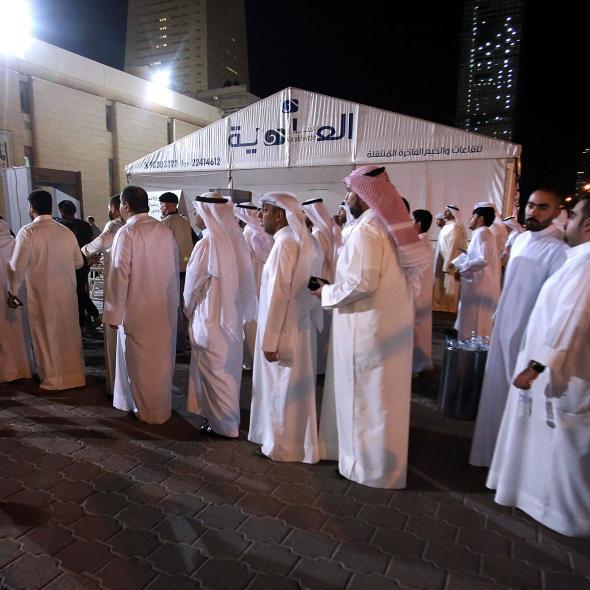The suicide bomber who killed 27 people and injured more than 200 at a Shi’ite mosque in Kuwait on Friday morning has been identified as Fahd Suliman Abdul-Muhsen al-Qabaa, a Saudi citizen in his early 20s who entered the country just hours before carrying out the attack. Not much is known yet about Qabaa’s background, affiliations, or where he was coming from when he arrived in Kuwait.
Local authorities are still investigating but have made several arrests in connection with the bombing, including the driver of a car seen leaving the mosque immediately afterward. The driver, 26-year-old Abdul-Rahman Sabah Aidan, is apparently a member of Kuwait’s Bidoon community. The Bidoon, short for bidoon jinsiyya (“without citizenship”), are mainly stateless descendants of desert nomads and are considered illegal residents by the Kuwaiti government. They form a significant underclass in Kuwait and their lack of legal status leaves them vulnerable to human rights violations.
Kuwaiti authorities also arrested the owner of the house where Aidan was found hiding, whom they described as “a supporter of the deviant ideology”. While Qabaa’s and Aidan’s connections to Islamic fundamentalist organizations remain unconfirmed, a group in Saudi Arabia affiliated with Islamic State (ISIS) had claimed credit for the bombing, identifying the perpetrator as “Abu Suleiman al-Muwahhid.”
Kuwait’s Grand Mosque held a mass funeral yesterday for the victims of the bombing, which was the first attack on a Mosque in the Gulf country’s history. The Sunni extremist group claiming responsibility said the atrocity was meant to punish the Shi’ite worshippers, whom they consider heretics. Kuwait, which is about one-third Shi’ite, has not experienced the same kind of sectarian violence witnessed in Iraq, Syria, or Yemen.
In Tunisia, investigators are on the hunt for accomplices to Friday’s machine gun attack on a beach resort in Sousse, in which at least 38 people, mostly foreign tourists, were killed. The gunman, 24-year-old Seifeddine Rezgui, was killed by police but is believed to have had help. Rezgui’s father and roommates have been taken in for questioning. The UK has sent a team of experts to assist in the search, as at least 15 Britons were killed in the attack.
And lastly, in France, suspected Islamist militant Yassin Salhi has admitted to beheading his boss, Herve Cornara, before attempting to cause an explosion at a chemical plant in the southern town of Saint Quentin-Fallavier on Friday. Salhi had taken a “selfie” with Cornara’s severed head and sent it to a Canadian phone number, whose owner has not yet been identified. Although Salhi had been on French authorities’ radar in the past due to associations with hardline Islamists, it is not clear whether he was acting on orders from a militant organization or on his own.
